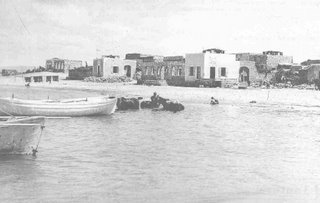
Nostalgia for a place to which I have never been
A small hill overseeing a clean beach and the most beautiful lagoon. This is where I wish to live, it is not just any generic place with these characteristics. Tantura, a Palestinian village north of Haifa, is this place, and ever I first heard of it I always wanted to live there. Tantura was a village which was largely destroyed by the third battallion of the Hagana's Alexandaroni Brigades. All the remaining structures, except two, sate back to either the crusader or ealier periods. In 2000 Teddy Katz, an Israeli Masters student at Haifa University wrote his dissertation on the massacare that forced the inhabitants to leave, the masacare is well documented in Arabic ( see Al-Khaldi, Kai La Nansa, or Abu Sitteh, The Right of Return: Sacred, Legal and Possible) however, this seemed like the first time someone breaks the news to the Israeli public that they might have put a "little" too much force into making Palestinians leave. So Katz was taking to court, forced to apoligise to the Israeli Army and Alexandaroni Brigades for defamation, and to the best of my knowledge forced to concede his academic degree. Way to go for academic freedom!
Katz incident shows how the larger circle of zionism deals with the attacks on it. How dare anyone, not only any israeli, but anyone, bash the 'purity of arms'. After all, their arms are so digustingly pure, I would not go near them.
Anyway, this is Tantura, if anyone asks me where i want to live, I will tell them to log on and see.
I have to acknowledge the picture which I borrowed from www.palestineremembered.com, for a good cause, I believe so they wont mind.
1 comment:
Dear Ned,
I read your reflections on Tantura with great interest, and would like to hear more from you about the choice of the village and of the picture as a representation of Palestine for you. Why did you choose Tantura? And why did you choose a small Palestinian village to represent Palestine nostalgically?
You write that this place is not generic; and yet it seems to me to represent Palestine for you. It is both specific, Tantura, and genreic--it stands for Palestine as a whole. Would you agee?
You write that since you "first heard of it I always wanted to live there." When did you first hear of it, and why did you always want to live there?
I arrived to your website by googling "Tantura," as I am writing a book about the memory of the Nakba in Israeli society by focusing on Tantura in the twentieth century. The book, in a nutshell, is about memory, loss, and the impossibility of any one group to claim to own exclusively Palestine/Israel.
I grew up in Israel and am now a professor for modern German and European history at the University of Virginia. My fields of interest are nationhood and memory, and I wrote extensively about the idea of homeland in Germany (Heimat) and about the local as a reprsentation of the national. You can see now why I am very interested in your reflections.
I'll be happy to send you some of my essays on memory and homeland if you shall send me your email.
With best wishes,
Alon Confino
confino@virginia.edu
Post a Comment